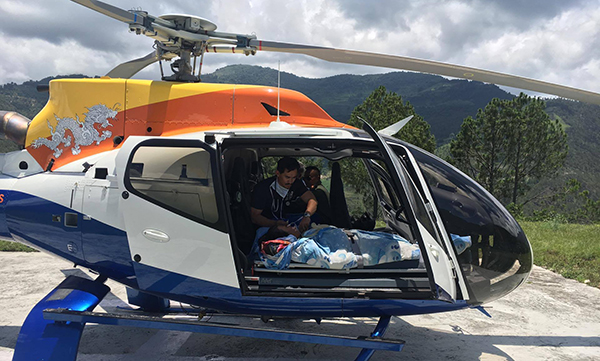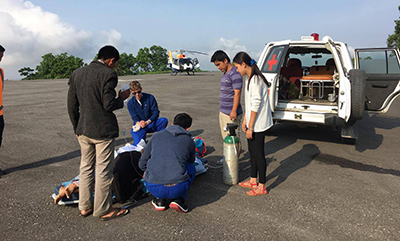 The Bhutan Emergency Aero Retrieval (BEAR) is leading in emergency health care delivery in the country by jumping to the rescue of patients in need of critical care and saving lives that would otherwise have been lost.
The Bhutan Emergency Aero Retrieval (BEAR) is leading in emergency health care delivery in the country by jumping to the rescue of patients in need of critical care and saving lives that would otherwise have been lost.
The service provided by BEAR has particularly benefited people living in the country’s remote pockets where quick access to health care remains a challenge, more so during life threatening emergencies.
In some places, people often have to walk for an hour or more to get to the nearest health centers. Lives are lost as the long journey prevents the sick from receiving timely treatment and care.
But BEAR, a three-member emergency response team, is changing this by flying to far-flung places to attend to life threatening emergencies. The team with the Royal Bhutan Helicopter Services Limited (RBHSL) provides the service to patients in need of immediate critical medical care and attention anywhere in the country.
The head of BEAR, Dr. Charles Haviland Mize, a resuscitation specialist, said he and his two other team members, who are veteran emergency nurses with the National Referral Hospital in Thimphu, have saved 12 lives since the team’s establishment in May.
“We have gone on just over 20 flights,” said Dr. Charles Haviland Mize. “Many of those patients, we cured their pain, set their broken bones and stopped bleeding but most importantly we have saved 12 lives.”
The idea to form such a team cropped up after the death of a 14-year-old boy from Trashigang who fell from a roof. The boy was brought to the National Referral Hospital but his life could not be saved. Dr. Charles said he would have lived had he received timely resuscitation and emergency care.
When asked about challenges, Dr. Charles said a lot of people in the country do not know about BEAR. “They don’t know about our ability to provide intensive care everywhere in the country.” He also shared that people call them late. “It’s important to call 112. If someone is sick, we can come and help before it is too late,” he added.
Weather is another challenge. “There are many lives that we would love to save but we get stopped by storm and bad weather,” said Dr. Charles.
At present, the team operates from the National Referral hospital. But it plans to move to a more strategic location to enable quicker response to medical emergencies across the country. The team also plans to increase its member to seven.










